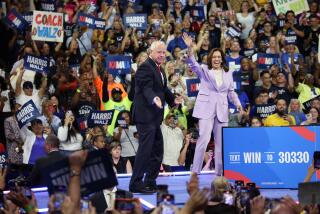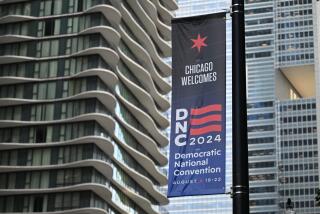Clinton Would Soften Welfare Law, Gore Says
- Share via
HUNTINGTON, W. Va. — As President Clinton opened a four-day train tour through key states Sunday, a top administration official said that if reelected, the president would use his new line-item veto powers to force Congress to soften the recently enacted welfare reform law--a move likely to mollify liberal Democrats on the eve of the party’s national convention.
Opening the final stage of the final campaign of his career, Clinton departed from here on a circuitous, but politically inspired, trek expected to culminate in his unanimous nomination for a second term in Chicago on Wednesday night.
As he seeks to become only the third member of his party in this century to win two presidential elections, Clinton is still engaged in a delicate balancing act. He is seeking to appeal to the moderate and conservative voters who supported him in 1992 but deserted the party in 1994, while at the same time trying to ensure peaceful relations with the more liberal party activists awaiting him in Chicago.
There, in a television interview, Vice President Al Gore said that while Clinton had signed the welfare bill, he is not through working on it.
Clinton would try to use the increased leverage he gains through the line-item veto next year to persuade Republicans to soften some provisions that have drawn the strongest liberal criticism, Gore said.
“The line-item veto gives the president more of an ability to bargain with the Congress about all kinds of things . . . “ Gore said on ABC-TV’s “This Week With David Brinkley.”
“The parts of the bill that we did not agree with, the cuts in food stamps and the provisions on immigrants, we will have an opportunity to fix,” he said, noting that at least some parts of the new law do not go into effect until July 1, 1997.
He suggested that Clinton will negotiate to restore spending and benefits in those areas. Under the line-item veto law passed this year, whoever is elected president in November will, for the first time, have the power to veto individual items of interest to members of Congress that are now protected inside huge, multi-item spending bills. The new law is expected to give the executive branch much greater power in negotiations with Congress.
Other administration officials confirmed Sunday that Gore’s remarks reflect the administration’s policy on the new welfare law.
Tune Is Changing
That message drew an immediate rebuke from Republicans, but came as leaders of the Democratic Party’s left wing appeared to soften their stance toward Clinton.
“We can be assured that if he says he [Clinton] will gut the welfare reform plan, he means it,” said Republican National Chairman Haley Barbour. Gore’s statement is further proof, Barbour said, that a second Clinton term would be a return to liberal government.
On the other side, although a number of protests from immigrant groups, children’s rights advocates and others are still expected in Chicago, prominent party liberals began to sing Clinton’s tune.
At a rally in Chicago on Sunday, the Rev. Jesse Jackson admonished liberals that one effect of the New Left protests at the 1968 Democratic convention was the election of Richard Nixon as president.
“We do have to make choices,” he said. Martin Luther King “chose Kennedy over Nixon, but neither of them ran on a public accommodation platform . . . Dr. King chose Johnson over Goldwater. Neither one ran on a voting-rights platform.” This year, he said, “there’s a choice between Clinton and Dole.”
For his part, as he opened his train trip, Clinton spared nothing in symbolism, pageantry or arm-waving oratory at his whistle-stop rallies. Repeatedly, he hammered away at his chief message: He has gotten the job done over the last four years and deserves a new term.
In 1992, he told an audience in Ashland, Ky., the nation was on the wrong track economically, and he promised to remedy it. “Four years later, I have come back to tell you we’re on the right track,” he declared.
Clinton’s trip down the Ohio River Valley, up through central Ohio and on to Michigan is designed to take him to the heart of territory that Republican nominee Bob Dole desperately needs to win if he is to deny Clinton a second term.
Clinton set out on his rail trip from Huntington, on the western edge of the state, and traveled to Ashland, then to Chillicothe and Columbus, Ohio. Over the next three days, his train, the “21st Century Express,” will wind through Michigan and northeast Indiana, where he will board a helicopter for a splashy arrival at the convention.
At each stop Sunday, he stoked enthusiastic crowds with blunt attacks on GOP adversaries who he said threatened his listeners’ old-age security and their children’s future.
“The most important thing is: Shall we keep going on the right track, or turn around?” he boomed to a crowd of more than 10,000 at this city’s neo-Colonial train station. “ . . . No U-turn!”
In addition to hailing his administration’s economic record, Clinton plans to ladle out a series of new policy proposals to underscore that he is in tune with the middle-class concerns and has a lot more to offer in a second term.
Today, Clinton is to air a new proposal to bar convicted wife abusers from having handguns. On Tuesday, he will propose new steps to promote literacy, and on Wednesday, he is to offer a new series of safeguards to protect the environment. These proposals are to be capped on Thursday, when, at his renomination, he proposes a measure to help rebuild the inner cities.
In addressing the whistle-stop crowds, Clinton abandoned his recent habit of trying to appear above the partisan fray and bluntly warned of recklessness of GOP congressional leaders.
In Huntington, he reminded the crowd of that “pivotal moment” in the 1995 federal budget fight, when the GOP leadership insisted that Democrats abandon the fight against a budget that he said would hurt the elderly in nursing homes, the families of people with disabilities and poor children.
His reply to the Republicans, he thundered, was: “Have at it--we don’t stand for blackmail--we stand up for Americans!”
Clinton told his audience he was going to Chicago, but on the way “I wanted to go on a train because I wanted to see people like you who I’ve been working for and fighting for for four years.”
Tax Plan Blasted
Clinton derided his Republican opponent’s principal proposal, for a $548-billion tax cut.
“That’s a pretty song, that big old tax cut,” he told the Ashland crowd. “But it’s like their [“contract With America”] . . . . It sounded pretty good in 1994--then the consequences came in in 1995 and 1996. If you give them the Congress and the White House . . . there won’t be anybody to say no.”
He warned of a tax that would “blow a big hole in the deficit, raise interest rates, raise your mortgage rates, your credit card payments, your car payments, and require even worse cuts than the ones we vetoed last year.”
Clinton has rarely bothered to visit staunchly Democratic West Virginia during his term, but his crowd was all a candidate could have hoped for--even as rescue-squad personnel carried out on gurneys people who were overcome by the late-August heat. More than a dozen more in Ashland were overcome and carried out.
Clinton admirers crowded rail trestles, overpasses and backyards as the train threaded its way through West Virginia and Kentucky hollows.
While Clinton delivered his pitch to the small-town crowds, Gore rallied Democratic delegates gathering in Chicago.
In a jovial, crowd-pleasing speech to the convention’s 900 delegates who are union members, Gore poked fun at the policies of what he called “two-headed monster of Dole and Gingrich.”
He repeatedly paired the names of the GOP nominee with the House speaker, whose popularity in the polls is at a low ebb, and never once mentioned the name of vice presidential nominee Jack Kemp.
“Dole and Gingrich believe that tax breaks for the rich will trickle down to the rest,” he said. “ . . . Dole and Gingrich believe that OSHA should be No-SHA. Dole and Gingrich believe the minimum wage should be as minimum as possible.”
Times staff writers Marc Lacey and Eleanor Randolph in Chicago contributed to this story. Richter reported from Huntington, W. Va., and Fritz from Chicago.
* RELATED STORIES, PHOTOS, GRAPHICS: A3, A5, A10-A13, E1, F1
(BEGIN TEXT OF INFOBOX / INFOGRAPHIC)
On the Trail, by Rail
President Clinton’s train trip to Chicago follows a route dictated by politics, not mileage. Kentucky and Ohio--the scenes of most of the events Sunday and today--are both states that Clinton won in 1992 by less than 5% of the vote and where Democrats suffered heavy defeats in 1994. Michigan, where he plans to travel Tuesday and Wednesday, was a more heavily Democratic state in 1992, but, again, one that saw heavy Democratic defections in 1994. If Clinton can hold these three states, Bob Dole would have virtually no way to win the election. West Virginia is almost always a Democratic state. Indiana is reliably Republican.
1) Huntington
2) Ashland
3) Chillicothe
4) Columbus
5) Arlington
6) Bowling Green
7) Toledo
8) Wyandotte
9) Royal Oak
10) Pontiac
11) East Lansing
12) Battle Creek
13) Kalamazoo
14) Michigan City
15) Chicago
More to Read
Get the L.A. Times Politics newsletter
Deeply reported insights into legislation, politics and policy from Sacramento, Washington and beyond. In your inbox twice per week.
You may occasionally receive promotional content from the Los Angeles Times.











